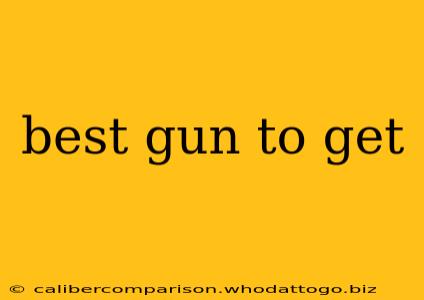Finding the Best Gun for You: A Comprehensive Guide
Choosing the "best" gun is highly subjective and depends entirely on your individual needs and circumstances. There's no single answer, as the ideal firearm varies greatly depending on intended use, experience level, and personal preferences. This guide will help you navigate the process of selecting the right firearm for you, emphasizing safety and responsible ownership throughout.
Understanding Your Needs: The Foundation of Gun Selection
Before even considering specific models, honestly assess your reasons for wanting a gun. Are you looking for:
- Self-defense? This requires a firearm easy to handle, reliable under stress, and appropriate for home defense or concealed carry. Consider factors like caliber, capacity, and ease of use.
- Home defense? Shotguns and larger handguns are often favored for home defense due to their stopping power. However, responsible ammunition selection and training are paramount to avoid unintended consequences.
- Hunting? The ideal firearm will depend on the type of game you intend to hunt. Rifles are typically used for larger game, while shotguns are common for smaller game and bird hunting.
- Sport shooting? This opens up a vast array of options, from handguns for target practice to rifles for long-range shooting. Accuracy, ergonomics, and personal preference heavily influence the choice here.
- Collecting? This is driven by personal interest and historical significance, leading to a wide range of potential choices.
Key Factors to Consider When Choosing a Firearm:
- Caliber: This refers to the diameter of the bullet. Larger calibers generally have more stopping power, but also greater recoil. Smaller calibers are often easier to handle and control. Research different calibers to understand their capabilities and suitability for your purpose.
- Action Type: This refers to how the firearm operates (e.g., semi-automatic, revolver, bolt-action, pump-action). Each action type has advantages and disadvantages regarding reliability, speed of firing, and maintenance.
- Ergonomics: A comfortable and well-fitting firearm is crucial for safe and accurate shooting. Consider the weight, grip size, and overall feel of the firearm in your hand.
- Reliability: Choose a firearm known for its reliability and consistent performance from reputable manufacturers. Research and read reviews to gauge a firearm's track record.
- Maintenance: Different firearms require varying levels of maintenance. Consider how much time and effort you're willing to dedicate to cleaning and upkeep.
Safety First: Education and Training Are Non-Negotiable
Regardless of your chosen firearm, prioritize safety and training. Never handle a firearm without proper instruction. Take a certified firearms safety course to learn safe handling, storage, and responsible gun ownership practices. This is absolutely essential before even considering purchasing a firearm.
The Importance of Research and Professional Advice
This guide provides a starting point, but thorough research is crucial. Read reviews, compare specifications, and visit reputable firearms dealers to handle different models. Consider consulting with experienced shooters or professionals who can offer personalized advice based on your specific needs and circumstances. Remember, the best gun is the one that you are properly trained to use safely and effectively for its intended purpose. Responsible gun ownership begins with education and careful consideration.

